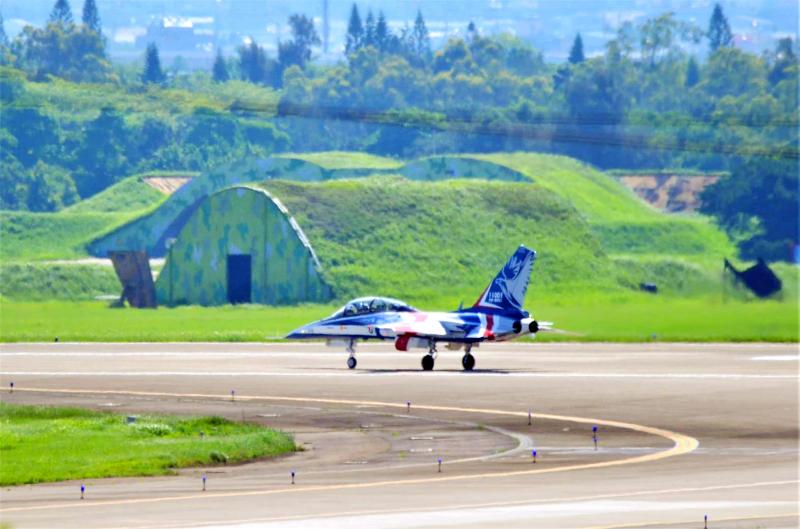The nation’s first indigenously manufactured advanced jet trainer, the Aerospace Industrial Development Corp (AIDC) T-5 (AT-5) Yung Ying (勇鷹, “Brave Eagle”), yesterday conducted its first preflight taxi test ahead of its planned flight test later this month.
Manufactured by AIDC, the AT-5 is scheduled to undergo flight testing at about the time of the Dragon Boat Festival, said a Ministry of National Defense official, who spoke on condition of anonymity.
The taxi test was conducted at the Ching Chuan Kang Air Force Base (清泉崗) in Taichung by AIDC, the ministry and the air force.

Photo courtesy of Military News Agency
The ministry did not announce the test to avoid attracting a crowd, but despite its best efforts, aviation enthusiasts still appeared in droves, the official said.
“We need to make some adjustments according to the results of the taxi tests, but plans for a first test flight in late June have not changed,” the official said, adding that test schedules have not been affected by the COVID-19 pandemic.
“We plan to hold two to three more taxi tests, including high-speed taxi tests, before the test flight,” the official said, adding that President Tsai Ing-wen (蔡英文) would be invited to oversee the test flight.
Two AIDC Indigenous Defense Fighters would be accompanying and assessing the test flight, as well as recording the event, the official said.
The initial test flight would be simple, with the AT-5 taking off and circling above the airport at a limited height before landing, the official said, adding that the airplane’s landing gear would remain extended during the flight.
The airplane’s design was completed in March 2018, with the A1 prototype — intended for testing — completed on Sept. 4 last year, the official said.
AIDC plans to deliver 66 AT-5s to the air force by 2026 to replace the AT-3s, which the air force plans to retire.

Beijing could eventually see a full amphibious invasion of Taiwan as the only "prudent" way to bring about unification, the US Department of Defense said in a newly released annual report to Congress. The Pentagon's "Annual Report to Congress: Military and Security Developments Involving the People's Republic of China 2025," was in many ways similar to last year’s report but reorganized the analysis of the options China has to take over Taiwan. Generally, according to the report, Chinese leaders view the People's Liberation Army's (PLA) capabilities for a Taiwan campaign as improving, but they remain uncertain about its readiness to successfully seize

HORROR STORIES: One victim recounted not realizing they had been stabbed and seeing people bleeding, while another recalled breaking down in tears after fleeing A man on Friday died after he tried to fight the knife-wielding suspect who went on a stabbing spree near two of Taipei’s busiest metro stations, Taipei Mayor Chiang Wan-an (蔣萬安) said. The 57-year-old man, identified by his family name, Yu (余), encountered the suspect at Exit M7 of Taipei Main Station and immediately tried to stop him, but was fatally wounded and later died, Chiang said, calling the incident “heartbreaking.” Yu’s family would receive at least NT$5 million (US$158,584) in compensation through the Taipei Rapid Transit Corp’s (TRTC) insurance coverage, he said after convening an emergency security response meeting yesterday morning. National

Taiwan is getting a day off on Christmas for the first time in 25 years. The change comes after opposition parties passed a law earlier this year to add or restore five public holidays, including Constitution Day, which falls on today, Dec. 25. The day marks the 1947 adoption of the constitution of the Republic of China, as the government in Taipei is formally known. Back then the Chinese Nationalist Party (KMT) governed China from Nanjing. When the KMT, now an opposition party in Taiwan, passed the legislation on holidays, it said that they would help “commemorate the history of national development.” That

Taiwan has overtaken South Korea this year in per capita income for the first time in 23 years, IMF data showed. Per capita income is a nation’s GDP divided by the total population, used to compare average wealth levels across countries. Taiwan also beat Japan this year on per capita income, after surpassing it for the first time last year, US magazine Newsweek reported yesterday. Across Asia, Taiwan ranked fourth for per capita income at US$37,827 this year due to sustained economic growth, the report said. In the top three spots were Singapore, Macau and Hong Kong, it said. South